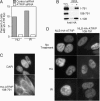ATRIP binding to replication protein A-single-stranded DNA promotes ATR-ATRIP localization but is dispensable for Chk1 phosphorylation
- PMID: 15743907
- PMCID: PMC1087242
- DOI: 10.1091/mbc.e04-11-1006
ATRIP binding to replication protein A-single-stranded DNA promotes ATR-ATRIP localization but is dispensable for Chk1 phosphorylation
Abstract
ATR associates with the regulatory protein ATRIP that has been proposed to localize ATR to sites of DNA damage through an interaction with single-stranded DNA (ssDNA) coated with replication protein A (RPA). We tested this hypothesis and found that ATRIP is required for ATR accumulation at intranuclear foci induced by DNA damage. A domain at the N terminus of ATRIP is necessary and sufficient for interaction with RPA-ssDNA. Deletion of the ssDNA-RPA interaction domain of ATRIP greatly diminished accumulation of ATRIP into foci. However, the ATRIP-RPA-ssDNA interaction is not sufficient for ATRIP recognition of DNA damage. A splice variant of ATRIP that cannot bind to ATR revealed that ATR association is also essential for proper ATRIP localization. Furthermore, the ATRIP-RPA-ssDNA interaction is not absolutely essential for ATR activation because ATR phosphorylates Chk1 in cells expressing only a mutant of ATRIP that does not bind to RPA-ssDNA. These data suggest that binding to RPA-ssDNA is not the essential function of ATRIP in ATR-dependent checkpoint signaling and ATR has an important function in properly localizing the ATR-ATRIP complex.
Figures






References
-
- Abraham, R. T. (2001). Cell cycle checkpoint signaling through the ATM and ATR kinases. Genes Dev. 15, 2177-2196. - PubMed
-
- Barr, S. M., Leung, C. G., Chang, E. E., and Cimprich, K. A. (2003). ATR kinase activity regulates the intranuclear translocation of ATR and RPA following ionizing radiation. Curr. Biol. 13, 1047-1051. - PubMed
-
- Bomgarden, R. D., Yean, D., Yee, M. C., and Cimprich, K. A. (2004). A novel protein activity mediates DNA binding of an ATR-ATRIP complex. J. Biol. Chem. 279, 13346-13353. - PubMed
Publication types
MeSH terms
Substances
Grants and funding
LinkOut - more resources
Full Text Sources
Other Literature Sources
Molecular Biology Databases
Research Materials
Miscellaneous

